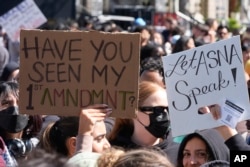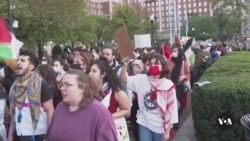Student Union
- By Hein
Know the Warning Signs in an Unpaid Internship
Not that it started out that way.
A few months after graduating from college with a degree in hospitality, I was offered an internship at one of the most prestigious hotels in New York City. Although it was an unpaid internship, I was delighted to be part of the team and was willing to work hard.
The evolution of my internship
I had applied to work in sales and marketing, but was initially placed in the housekeeping department. For the first three months of the internship, I was mostly assigned to manual labor such as vacuuming, wiping mirrors, scrubbing floors, or carrying boxes.
After months of this, however, I was ready for responsibilities that would do more to train me for my intended career path. I decided to talk with the assistant director of the housekeeping department about opportunities to learn more about his role and his day-to-day job routine, and he agreed to train me personally for the next four months. It was a tremendous opportunity for me to finally absorb how the hospitality industry works and to get hands-on experience in running a successful department.
I got another good opportunity when my request to be transferred into the sales and marketing department, my original first-choice department, was approved. I finally got to work in my desired field.
But after only a few months, Human Resources reassigned me to work temporarily as a bellboy. The HR director promised it would not be for more than a week and that I was only there to give a helping hand, but I ended up working as a bellboy for over a month.
I was practically working as a full-time employee, but without any pay.
The law and unpaid interns
The U.S. Department of Labor sets out six criteria to determine when (under the Fair Labor Standards Act) an intern or trainee may work for free for a for-profit company. In particular, the intern must receive a benefit from the position, including training and education, and the intern must not fill a position that would normally require a regular employee [see the full list]. If these six criteria are not met, an intern must be paid for their labor.
Universities often place restrictions on what types of unpaid internships may be listed in their career search databases, and some states have attempted to crack down on unpaid internships, but by and large it is an intern’s responsibility to look out for their interests when they take a position.
I could have chosen to file a grievance with the Department of Labor, which might have resulted in the hotel being investigated and charged a fine. Or I could have even filed a lawsuit, which some interns at major media companies have done to recover unpaid wages.
The lesson I learned
What I eventually did was give in my one-week notice when the HR director assigned me to keep working as a bellboy until they could find someone to replace me. With no certainty to how much longer they were going to take to find a full-time employee, I could not bear it anymore and decided to leave the hotel.
Looking back, I did not have a completely wasted internship. The time I spent working with the head of hospitality and in the sales department were valuable experiences. But I also didn’t know enough to realize that they were doing something wrong by using me to do housekeeping and bellboy work.
It was a valuable lesson for the future. If I were to encounter a similar situation again, I would definitely speak up and confront higher management. It's my obligation to protect my rights as an employee and my needs as a trainee.
See all News Updates of the Day
- By VOA News
Studying STEM? International students have funding options

US News & World Report takes a look at funding options for international students pursuing STEM degrees in the U.S.
The article explains the different kinds of scholarships and grants and offers tips on getting part-time jobs and private student loans. Read the full story here. (March 2024)
- By Robin Guess
US campuses are battlegrounds in free speech debate
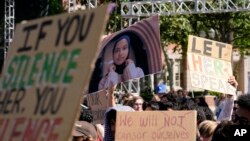
This week the University of Southern California canceled the graduation speech of its senior class valedictorian at a time when there is a growing debate over the limits of free speech on American college campuses.
USC’s Asna Tabassum, a Muslim biomedical engineer major, was selected from among 100 outstanding students to address the graduating class of 2024 this May. However, the school withdrew the invitation for her to speak at the graduation ceremony citing safety concerns.
Tabassum denounced the decision, which she attributed to her public support for Palestinian human rights. She said it is part of “a campaign of hate meant to silence my voice.”
The school maintains it is a safety issue, not about free speech. School officials say they received an alarming number of violent threats after selecting her as speaker.
USC is one of many American universities that have struggled with policies over free speech and campus protest since October’s Hamas terrorist attack on Israel and the continuing fighting in Gaza. After weeks or months of on-campus protests and rallies, schools have been taking more forceful action to punish protesters who administrators say have become disruptive.
On Thursday at Columbia University in New York, police arrested more than 100 students who had gathered on campus for pro-Palestinian protests. The school’s dean wrote that the protesters had been told several times that they were violating university policies and would be suspended. The students say they were exercising their free speech rights.
At Washington’s American University, protests in all campus buildings have been banned by the school’s president since January. Under the new policy, students may not hold rallies, engage in silent protests or place posters in any campus building.
Protests and safety
University students have a long history of engaging in political activism. From the Vietnam War to abortion rights, universities have played a key role in American political debates.
However, students now say that schools like AU with a long-standing protest culture are silencing protesters with new rules.
Arusa Islam, American University student body president-elect and current vice president, says the policies are preventing an open discussion about U.S. foreign policy.
“Indoor protesting was never a problem, it was never an issue before October 7th,” Islam said. “Students were allowed to put up posters in buildings and students were allowed to have a silent protest.”
“And now we don’t have that right anymore,” she added. “We have been silenced and it is affecting us greatly.”
American University’s president, Sylvia Burwell, says the school’s new policies are intended to ensure that protests do not disrupt university activity.
Burwell also referred to recent events on campus that “made Jewish students feel unsafe and unwelcome.” She added, antisemitism is abhorrent, wrong, and will not be tolerated at American University.
While administrators insist that they are making narrow restrictions in the interests of providing an education, critics say the policies have a far-reaching effect.
At Cornell University, where new rules took effect in January, Claire Ting, the executive vice president of the Cornell Student Assembly, said the policies have had an unsettling effect on campus.
“The campus climate at Cornell has been tense surrounding free speech in recent times,” Ting emailed VOA.
Ting said that both students and faculty feel the policy has had chilling effects on free expression.
“Students report facing arbitrary, escalating punishment for violating the policy, with the policy itself lacking clear outlines for the consequences of civil disobedience,” she added.
In its new policy Cornell warns students that disciplinary action may be taken if protests impede people or traffic, damage school property or interfere with the school’s operations in any way.
In its campus-wide notice explaining the new guidelines, the school wrote that the new policy would ensure that expressive activity is allowed but must remain nonviolent.
The Foundation for Individual Rights in Education, also known as FIRE, has tracked free speech issues on American campuses.
FIRE and College Pulse have produced an annual survey, since 2022, ranking colleges based on their policies and what students say about the free speech climate on campus.
This year the group reported that “alarming” numbers of students say they self-censor or “find their administrations unclear” on free speech issues.
“College campuses have always been places where students have been unafraid to express themselves and with the recent Gaza conflict after the 10/7 attacks, it’s been very heated on both sides of this issue,” said Zach Greenberg, the senior program officer of FIRE.
Harvard ranked last in this year’s survey. FIRE said the school punished some professors and researchers over what they had said or written, and students reported a poor climate for free speech on campus.
The controversy came to Congress late last year, when Harvard’s president testified over complaints of widespread antisemitism.
“I don’t think you’d find many students on campus right now that would say we are the model for flourishing free speech and ideas exchange in the country,” said J. Sellers Hill, president of Harvard’s school newspaper The Harvard Crimson.
“But I think you’ve really seen that be acknowledged by administrators and it seems to be something they are dedicated to taking on.”
As the head of The Harvard Crimson, Hill manages the paper’s 350 editors and 90 reporters, who’ve covered, in detail, the ongoing free speech/protests controversy and the resignation of former President Claudine Gay following her testimony to Congress.
“I think no one would dispute Harvard has work to do and progress to make,” Hill said. “I think it’s a tough sell, for me, that Harvard is uniquely in its own league in terms of intolerance of speech. That doesn’t square with what I have seen on our college campus or on other college campuses around the country. I think Harvard is held to a higher standard.”
Proposed settlement offered over financial aid allegations
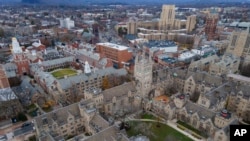
A group of U.S. colleges and universities have agreed to settle a lawsuit alleging deceptive financial aid tactics, according to a report published in The Hill.
The schools would pay $284 million to plaintiffs who were enrolled full-time and received financial aid between 2003 and 2024.
The schools have denied the allegations. (April 2024)
Universities in Middle East building research relationships with China

As China bolsters research relationships with universities in the Middle East, the United States has taken notice – especially when that research involves artificial intelligence.
Reporting for University World News, Yojana Sharma has the story. (March 2024)
Tips for staying safe while studying in the US
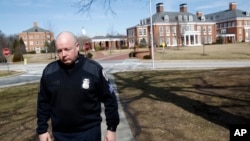
Recent news events have raised safety concerns among some international students studying in the United States.
Adarsh Khandelwal, writing in the India Times, has tips for staying safe from the moment you arrive until the day you complete your studies. (March 2024)




